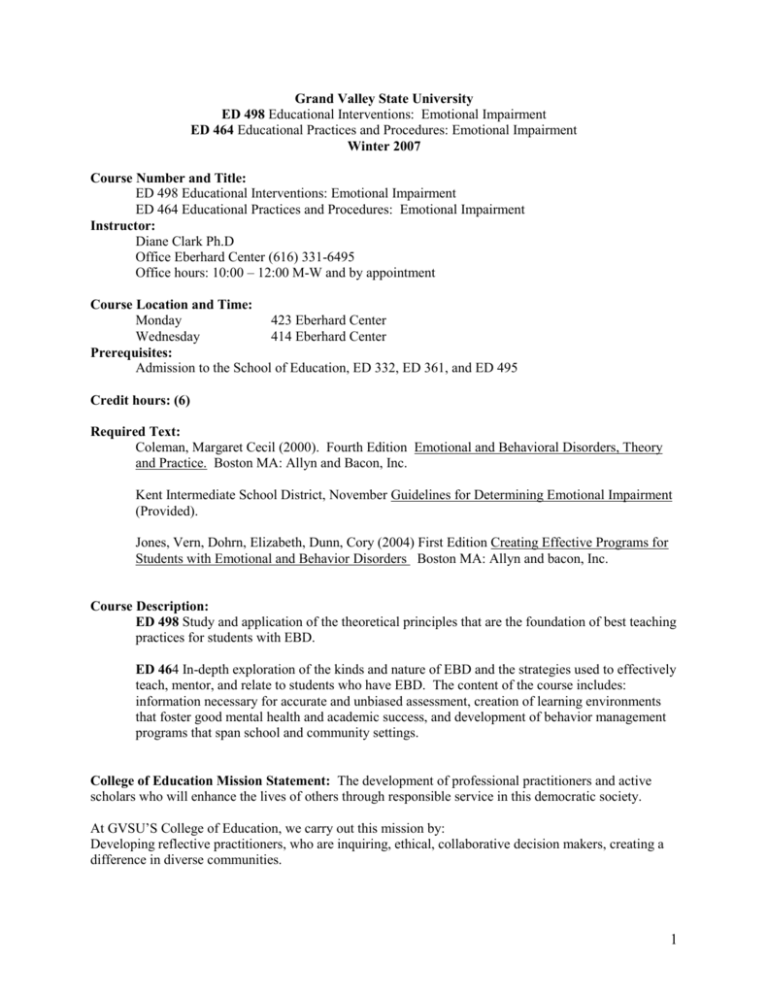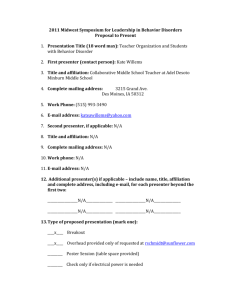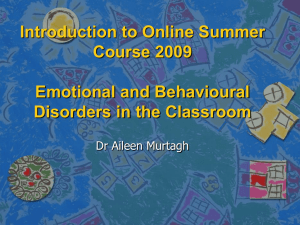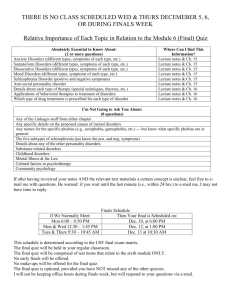Gvsu - Grand Valley State University
advertisement

Grand Valley State University ED 498 Educational Interventions: Emotional Impairment ED 464 Educational Practices and Procedures: Emotional Impairment Winter 2007 Course Number and Title: ED 498 Educational Interventions: Emotional Impairment ED 464 Educational Practices and Procedures: Emotional Impairment Instructor: Diane Clark Ph.D Office Eberhard Center (616) 331-6495 Office hours: 10:00 – 12:00 M-W and by appointment Course Location and Time: Monday 423 Eberhard Center Wednesday 414 Eberhard Center Prerequisites: Admission to the School of Education, ED 332, ED 361, and ED 495 Credit hours: (6) Required Text: Coleman, Margaret Cecil (2000). Fourth Edition Emotional and Behavioral Disorders, Theory and Practice. Boston MA: Allyn and Bacon, Inc. Kent Intermediate School District, November Guidelines for Determining Emotional Impairment (Provided). Jones, Vern, Dohrn, Elizabeth, Dunn, Cory (2004) First Edition Creating Effective Programs for Students with Emotional and Behavior Disorders Boston MA: Allyn and bacon, Inc. Course Description: ED 498 Study and application of the theoretical principles that are the foundation of best teaching practices for students with EBD. ED 464 In-depth exploration of the kinds and nature of EBD and the strategies used to effectively teach, mentor, and relate to students who have EBD. The content of the course includes: information necessary for accurate and unbiased assessment, creation of learning environments that foster good mental health and academic success, and development of behavior management programs that span school and community settings. College of Education Mission Statement: The development of professional practitioners and active scholars who will enhance the lives of others through responsible service in this democratic society. At GVSU’S College of Education, we carry out this mission by: Developing reflective practitioners, who are inquiring, ethical, collaborative decision makers, creating a difference in diverse communities. 1 Program Standards: This course supports the standards as outlined by the State of Michigan Entry Level Standards for Elementary Teachers and the National Council for Accreditation of Teacher Education (NCATE). This course also supports the Council for Exceptional Children (CEC) Code of Ethics and Standards for Professional Practice, and addresses subject related competencies as identified in the CEC Common Core of Knowledge and Skills Essential for All Beginning Special Education Teachers. Course Objectives: Students will: 1. Develop knowledge and understanding of the theoretical and practical foundations related to the diagnosis and teaching of students with mild to severe behavioral disorders. 2. Understand, recognize and identify the characteristics of students who have mild and severe emotional/ behavioral disorders and their effect on learning, self-concept, work, social relationships and problem solving. 3. Identify and interpret assessments most frequently used to identify, diagnose and plan for students with mild to moderate emotional/behavior disorders 4. Articulate and practice communication strategies and patterns that reflect knowledge, understanding and respect for the personal challenges and abilities of students with mild to severe behavioral disorders and their families including an appreciation of the role of culture and socialization in student behavior and performance. 5. Collect and manage data related to student behavior and academic performance for the purpose of creating positive social and academic learning experiences. 6. Demonstrate the ability to identify and understand a variety of strategies for preventing and managing inappropriate student behavior. 7. Recognize current effective instructional practices that create optimum learning experiences for all students and demonstrate the ability to apply, adapt and differentiate instruction where necessary to provide meaningful effective learning experiences for students with mild to severe emotional and behavioral disorders. 8. Describe curricular outcomes and goals for students with mild to severe emotional/behavior disorders. Explain how attainment of these outcomes can result in the successful transition student to productive adult and community member. 9. Demonstrate knowledge of legal definitions, decisions, issues, and solutions relative to educating students with mild to severe emotional and behavioral disorders, including knowledge of successful placements and programs for students, resources for their parents and community support for adults with emotional/behavior disorders. 10. Demonstrate knowledge and understanding of the IEP process and the role of all participants as it applies to students with mild to severe emotional and behavior disorders. 2 Mode of Instruction: Individual/group projects, papers and presentations Large/small group discussions/simulations/ role plays Web-enhanced instruction Course Requirements: 1. Active participation: in every class is expected. Participation includes actively joining in group discussions, small group assignments and activities as well as completing weekly class assignments. Attendance at your placement is also included in this requirement. 2. Absenteeism: Students with more than one absence may receive an incomplete and have to retake this course in another semester. If you must miss class, contact the professor prior to the time the class meets, otherwise your absence will be unexcused. If you need to miss your placement, contact your supervising teacher first, then contact the professor and let them know you will be absent. 3. Students are expected to type and double space all papers. 4. In class work cannot be made up outside of class if missed. Assignments 1. Weekly Quiz (s) 10 points each 2. 3. 4. 5. 6. 7. 8. Affective Learning Unit Collaboration Assignment Agency Review Mid-term Exam Functional Behavior Analysis Positive Behavior Support plan Emotional and Behavioral Disorder Descriptions 20 points 25 points 15 points 50 points 25 points 25 points 50 points 9. Final Exam 100 points Grading: Percent 95-100 91-94 88-90 84-87 81-83 78-80 74-77 Grade A AB+ B BC+ C 3 Projects/ Papers and Exams If you should require any adjustment in due date, arrangements must be made prior to date project is to be turned in. Failure to do this will result in 10% being deducted from the total points for that assignment for each day it is late. All exams will be taken at the scheduled time unless prior arrangements have been made with the instructor If you have any situation or condition which you feel would interfere with your ability to complete the above requirements please notify the instructor during the first class session. We will work together to provide the equipment, time and materials that will enable you to successfully complete the course requirements. Academic Honesty: Please review Grand Valley’s policy on academic dishonesty in the 2004/2005 Catalog and the Student Code. 4 Tentative Course Topic Schedule Winter 2007 Date Week 1 January 8 Topic Assignment Introductions Student/instructor expectations Syllabus review Chapter 1 Chapter 2 Coleman Jones 85-95 Kent Document CEC Standards Endorsement Test objectives Historical perspectives of EI Definition and identification of student with EI Characteristics Identification procedures Ethical and legal considerations Quiz 1 Week 2 January 15 Biophysical Definition and basic view Cause and development of behavior Evaluation procedures Educational applications Chapter 3 Coleman Psychodynamic Model Definition and basic view Causes Educational application Cognitive Behavior Modification Techniques Chapter 4 Coleman Quiz 2 Week 3 January 22 Cognitive Model Definition and basic view Etiology and Development of Disordered Behavior Evaluation procedures Educational procedures Chapter 5 Coleman Behavioral Model, Review Quiz 3 Chapter 6 Coleman 5 Week 4 January 29 Ecological/Systems Model Definition and basic view Etiology and Development of Disordered Behavior Evaluation procedures Educational procedures Therapeutic milieu Chapter 7 Psychological Development of Students With EBD Chapter 2 Jones Functional Behavior Assessment Behavior Support Plan Quiz 4 Agency Visitation Assignment Due Kent Document Jones pg. 247 288 Week 5 February 5 Internalizing Disorders Definition and prevalence Characteristics and symptoms Related conditions Causes Intervention and treatment Social withdrawal Externalizing Disorders Attention deficit Hyperactivity Disorder Characteristics, assessment Education strategies Conduct disorders Definition Cause Intervention/Treatment Educational implications Other externalizing disorders EBD and violent behavior Adolescent Issues Quiz 5 EBD Disorders Description Assignment Due Chapter 8 Coleman Chapter 9 Coleman 6 Week 6 February 12 Assessment and Instruction Jones Chapeter 3 Issues and Instruments Cultural Considerations Policies and Procedures to Reduce Referrals and Ensure Appropriate Eligibility and Placement Decisions IEP, Planning and Implementation Quiz 6 Mid-Term Exam Week 7 February 19 Designing Quality Programs Key Components Environmental Management Classroom Organization Resources Physical Space Emotional Climate Communication Behavior management Procedures Management Systems Behavioral Interventions Quiz 7 Collaboration Assignment Due Week 8 February 26 Affective Education, Systematic Instruction Personal, Relationship and Social/Life Skills Student Focused Curriculum Instructional Practices Individuation and Personalization Teaching/counseling strategies Quiz 8 Functional Behavior Assessment Due Chapter 4 Jones Chapter 5 Jones Chapter 8 Jones Jones pg. 290 333 7 Week 9 March 5 Academic/Curriculum Modification/alternatives Structures and accommodations/transitions/choice Chapter 6 Jones Effective Instruction Developmentally appropriate curriculum Quiz 9 Affective Learning Unit Due Week 10 March 12 Final Exam Review Small Group presentations Behavior Improvement Plan Due Quiz 10 Final Exam 8








